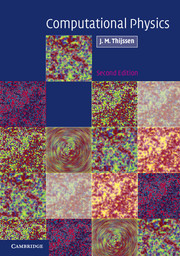Book contents
- Frontmatter
- Contents
- Preface to the first edition
- Preface to the second edition
- 1 Introduction
- 2 Quantum scattering with a spherically symmetric potential
- 3 The variational method for the Schrödinger equation
- 4 The Hartree–Fock method
- 5 Density functional theory
- 6 Solving the Schrödinger equation in periodic solids
- 7 Classical equilibrium statistical mechanics
- 8 Molecular dynamics simulations
- 9 Quantum molecular dynamics
- 10 The Monte Carlo method
- 11 Transfer matrix and diagonalisation of spin chains
- 12 Quantum Monte Carlo methods
- 13 The finite element method for partial differential equations
- 14 The lattice Boltzmann method for fluid dynamics
- 15 Computational methods for lattice field theories
- 16 High performance computing and parallelism
- Appendix A Numerical methods
- Appendix B Random number generators
- Index
Appendix B - Random number generators
Published online by Cambridge University Press: 05 June 2012
- Frontmatter
- Contents
- Preface to the first edition
- Preface to the second edition
- 1 Introduction
- 2 Quantum scattering with a spherically symmetric potential
- 3 The variational method for the Schrödinger equation
- 4 The Hartree–Fock method
- 5 Density functional theory
- 6 Solving the Schrödinger equation in periodic solids
- 7 Classical equilibrium statistical mechanics
- 8 Molecular dynamics simulations
- 9 Quantum molecular dynamics
- 10 The Monte Carlo method
- 11 Transfer matrix and diagonalisation of spin chains
- 12 Quantum Monte Carlo methods
- 13 The finite element method for partial differential equations
- 14 The lattice Boltzmann method for fluid dynamics
- 15 Computational methods for lattice field theories
- 16 High performance computing and parallelism
- Appendix A Numerical methods
- Appendix B Random number generators
- Index
Summary
Random numbers and pseudo-random numbers
Random numbers are used in many simulations, not only of gambling tables but also of particle accelerators, fluids and gases, surface phenomena, traffic and so forth. In all these simulations some part of the system responsible for the behaviour under investigation is replaced by events generated by a random number generator, such as particles being injected into the system, whereas the source itself is not considered. Here we discuss various methods used for generating random numbers and study the properties of these numbers.
Random numbers are characterised by the fact that their value cannot be predicted. More precisely, if we construct a sequence of random numbers, the probability distribution for a new number is independent of all the numbers generated so far. As an example, one may think of throwing a die: the probability of throwing a 3 is independent of the results obtained before. Pure random numbers may occur in experiments: for a radioactive nucleus having a certain probability of decay, it is not possible to predict when it will decay. There is an internet service, http://www.fourmilab.ch/hotbits/ which creates random numbers in this way and sends them over the internet (a careful correction has been carried out to remove any bias resulting in a majority of either 1 or 0). These numbers are truly random [1, 2].
On the other hand, random numbers as generated by a computer are not truly random. In all computer generators the new numbers are generated from the previous ones by a mathematical formula.
- Type
- Chapter
- Information
- Computational Physics , pp. 605 - 612Publisher: Cambridge University PressPrint publication year: 2007



